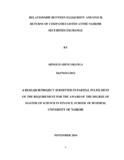| dc.description.abstract | The objective of this study was to determine the relationship between illiquidity and
stock returns of companies listed at the Nairobi Securities Exchange. The research design
was descriptive using two proxies to Illiquidity, the return to volume ratio which was
proposed by Amihud (2002) and reversal measure of illiquidity advocated by Pastor and
Stambaugh (2003), in a cross-sectional framework of Fama and Macbeth (1973), the
study was undertaken to ascertain the nature of this relationship at the NSE for a5 year
period 2009- 2013.The data was obtained from the Nairobi Securities exchange in a daily
format, which was then converted to a monthly format to fit with the research design, the
Sample comprised of portfolios created from stocks that were continuously traded during
this period. The Illiquid test carried out using the two proxies to illiquidity showed
significantly high Illiquidity for portfolios that had stocks whose characteristics had
either fewer deals at the exchange, lowest volume, or lowest turnover respectively.
Portfolio of stocks which bore high trade deals, high volume and highest turnover had
low illiquidity.Illiquidity portfolio return relationship was established using the three
variables, volume, illiquidity and market premium. Test of the Fama and Macbeth (1973)
models significance, F-test, revealed a p-value well below 0.5% for a 99% confidence
interval, showing strong significance level for all the 30 portfolios. This was an indicator
that illiquidity positively affects stock returns at the Nairobi Securities Exchange, a
relationship such that higher illiquidity would translate to above the market returns. This
is consistent with major study findings that, since illiquidity is persistent, illiquidity
predicts future returns and illiquidity co-moves with contemporaneous returns, this is as
positive shock to illiquidity predicts high future illiquidity | en_US |

